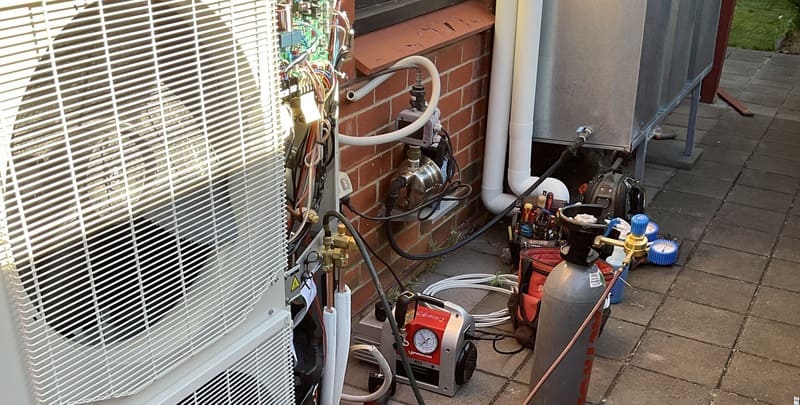
How Long Will Your Air Conditioner Last?
Have you ever wondered just how long your trusty air conditioner will keep you cool during those scorching summer days?
It’s a question many homeowners ponder, and for good reason. After all, air conditioning systems are significant investments in both comfort and convenience. Understanding the lifespan of your air conditioner can help you plan for maintenance, repairs, and ultimately, replacement.
Air conditioners aren’t just appliances; they’re essential companions in modern living, providing respite from sweltering temperatures and creating a comfortable indoor environment. But like any machinery, they don’t last forever.
Factors such as installation quality, maintenance practices, and environmental conditions all play a role in determining how long your air conditioner will keep chugging along.
In this article, we’ll delve into the intricacies of air conditioner lifespan. We’ll explore the average longevity of different types of air conditioners, the factors that can affect their lifespan, and crucial signs indicating it might be time for a replacement.
By the end, you’ll have a clearer picture of what to expect from your air conditioning unit and how to maximise its lifespan for years of uninterrupted comfort.
Understanding Air Conditioner Lifespan
Knowing your air conditioner’s lifespan is like having a crystal ball into the future of your home comfort. But what exactly does “lifespan” mean in the context of air conditioning?
Simply put, it’s the length of time you can expect your cooling system to operate effectively before needing significant repairs or replacement.
Now, you might be wondering, “Well, how long is that?” The truth is, it varies. Different types of air conditioners, from central units to ductless mini-splits, have different lifespans. On average, though, you can expect your AC to last anywhere from 10 to 15 years with proper care and maintenance.
But here’s the kicker: the lifespan of your air conditioner isn’t set in stone. It’s influenced by a variety of factors, some of which you can control and others that are out of your hands. We’re talking about things like the quality of installation, how well you maintain your unit, the environmental conditions it’s exposed to, and even your usage habits.
In the next sections, we’ll break down each of these factors so you can get a better grasp on what might be impacting the lifespan of your air conditioner. So, grab a cold drink, sit back, and let’s dive into the world of air conditioner longevity.
Factors Affecting Air Conditioner Longevity
A number of factors have an impact on the lifespan of your air conditioner, including:
Quality of Installation
- Professional installation ensures proper sizing and placement of the unit.
- Amateur or improper installation can lead to performance issues and premature wear.
Maintenance Practices
- Regular cleaning of filters and coils prevents dirt buildup, ensuring optimal efficiency.
- Scheduled professional maintenance checks identify and address potential issues early on.
Environmental Factors
- Climate conditions, such as extreme heat or humidity, can strain the unit.
- Exposure to debris, pollutants, and corrosive elements can accelerate wear and tear.
Usage Patterns
- Frequent use during peak seasons can put strain on the system.
- Setting appropriate temperature levels and using programmable thermostats can reduce unnecessary wear.
Understanding these factors is key to prolonging the lifespan of your air conditioner. By addressing installation, maintenance, environmental influences, and usage habits, you can help ensure that your cooling system stays reliable for years to come.
In the following sections, we’ll delve deeper into each factor, providing insights and tips to help you maximise the longevity of your air conditioner.
Signs Your Air Conditioner Might Need Replacement
Your air conditioner is a workhorse, tirelessly keeping you cool during the hottest days. But like all good things, it won’t last forever.
Here are some tell-tale signs that your faithful cooling companion might be nearing the end of its lifespan:
- Decline in cooling efficiency: If your AC struggles to cool your home as effectively as it once did, it could be a sign of ageing components or impending failure. If you’re getting warm air when you desire cold air, your air conditioning unit is telling you something. It will also result in decreased energy efficiency.
- Strange noises or odours: Unusual sounds like banging, squealing, or grinding, as well as strange smells coming from your AC unit, could indicate mechanical issues that warrant attention. It’s likely to be producing poor indoor air quality.
- Frequent breakdowns and repairs: If you find yourself calling the repair technician more often than usual, it might be more cost-effective to invest in a new unit rather than continuously patching up an old one.
- Increased energy bills: As air conditioners age, they become less efficient, leading to higher energy consumption and consequently, inflated utility bills.
- Age of the air conditioner: As a general rule of thumb, if your air conditioner is more than 10-15 years old and exhibiting any of the aforementioned signs, it’s likely time to start considering a replacement.
Recognising these signs early on can save you from unexpected breakdowns and discomfort during the peak of summer. If you need to replace your air conditioner, it’s best to be proactive before it becomes an emergency.
This applies to split system air conditioners, reverse cycle air conditioners, ducted air conditioners, portable air conditioners and any other type you may have.
In the next section, we’ll explore steps you can take to extend the life of your air conditioner system and when it might be time to start shopping for a new one.
Extending the Lifespan of Your Air Conditioner
Your air conditioner works hard to keep you cool and comfortable, so it’s only fair to give it a little TLC in return. With some proactive care and attention, you can help ensure that your cooling system stays in top shape for as long as possible.
Here’s how:
- Proper installation and maintenance: From day one, make sure your air conditioner is installed correctly by a professional. Additionally, stick to a regular maintenance schedule, including cleaning or replacing filters, clearing debris around the unit, and scheduling professional tune-ups.
- Regular cleaning and filter replacement: Dust and debris can build up inside your air conditioner, reducing its efficiency and lifespan. Make it a habit to clean or replace filters every 1-3 months, depending on usage, and schedule professional cleanings as needed.
- Monitoring and addressing performance issues: Keep an eye (and ear) out for any unusual noises, odours or changes in cooling performance. Addressing issues promptly can prevent small problems from turning into major repairs down the line.
- Upgrading to energy-efficient models: If your air conditioner is on its last legs or you’re looking to replace it, consider investing in an energy-efficient model. Not only will it help lower your energy bills, but it’ll also reduce wear and tear on the unit, potentially extending its lifespan.
By taking these steps to care for your air conditioner, you can enjoy reliable cooling comfort for years to come.
In the final section, we’ll wrap up our discussion on air conditioner lifespan and leave you with some key takeaways for maximising the longevity of your cooling system.

Stay Vigilant and Stay Cool
Your air conditioner is more than just a machine; it’s your ally in staying cool and comfortable during the sweltering summer months. Understanding its lifespan and taking proactive steps to care for it can make all the difference in how long it continues to serve you faithfully.
From the moment it’s installed, your air conditioner begins a journey that’s influenced by factors ranging from maintenance practices to environmental conditions. By staying vigilant and addressing issues promptly, you can help extend its lifespan and avoid unexpected breakdowns.
Remember, signs like declining efficiency, strange noises, and frequent repairs are signals that it might be time to consider a replacement. But with proper care and attention, you can delay that day and enjoy reliable cooling for years to come.
So, whether you’re lounging in the comfort of your air-conditioned home or planning for the future, keep these tips in mind to maximise the lifespan of your cooling system. With a little care and attention, your air conditioner will continue to be your steadfast companion through many summers to come.
Please note: This information is provided for advice purposes only. Regulations differ from state to state, so please consult your local authorities or an industry professional before proceeding with any work. See Cyber Air Conditioning’s Terms & Conditions here.
